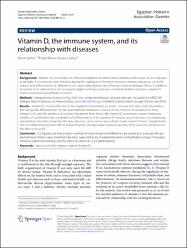| dc.contributor.author | Şanlıer, Nevin | |
| dc.contributor.author | Güney Coşkun, Merve | |
| dc.date.accessioned | 2022-10-27T13:21:53Z | |
| dc.date.available | 2022-10-27T13:21:53Z | |
| dc.date.issued | 2022 | en_US |
| dc.identifier.citation | Şanlıer, N. ve Güney Coşkun, M. (2022). Vitamin D, the immune system, and its relationship with diseases. Egyptian Pediatric Association Gazette, 70(1). https://doi.org/10.1186/s43054-022-00135-w | en_US |
| dc.identifier.issn | 1110-6638 | |
| dc.identifier.issn | 2090-9942 | |
| dc.identifier.uri | https://doi.org/10.1186/s43054-022-00135-w | |
| dc.identifier.uri | https://hdl.handle.net/20.500.12511/9888 | |
| dc.description.abstract | Background: Vitamin D is classified as an immunomodulatory hormone that is synthesized because of skin exposure to sunlight. It is known to come into play during the regulation of hormone secretion, immune functions, cell proliferation, and differentiation. Its deficiency can cause many diseases and their associated pleiotropic effects. In addition, in relation to its eminent function as regards adaptive immune response and innate immune response, vitamin D level is associated with immune tolerance.
Methods: Literature search prior to May 2021 was conducted through selected websites, including the MEDLINE, Embase, Web of Science, Cochrane Central, www.ClinicalTrials.gov , PubMed, Science Direct, Google Scholar, and EFSA.
Results: Vitamin D is found effective for the regulation of hormone secretion, immune functions, and cell proliferation along with differentiation. Its role as an immune modulator is based on the presence of receptors on many immune cells and the synthesis of its active metabolite from these cells. Vitamin D, an immune system modulator, inhibits cell proliferation and stimulates cell differentiation. A fair number of immune system diseases, encompassing autoimmune disorders alongside infectious diseases, can occur because of low serum vitamin D levels. Supplementation of vitamin D has positive effects in lessening the severity nature of disease activity; there exists no consensus on the dose to be used.
Conclusion: It is figured out that a higher number of randomized controlled trials are essential to evaluate efficacy pertaining to clinical cases, treatment duration, type, and dose of supplementation and pathophysiology of diseases, immune system functioning, and the effect of vitamin D to be administered. | en_US |
| dc.language.iso | eng | en_US |
| dc.publisher | Springer | en_US |
| dc.rights | info:eu-repo/semantics/openAccess | en_US |
| dc.rights | Attribution 4.0 International | * |
| dc.rights.uri | https://creativecommons.org/licenses/by/4.0/ | * |
| dc.subject | Diseases | en_US |
| dc.subject | Health | en_US |
| dc.subject | Immune System | en_US |
| dc.subject | Vitamin D | en_US |
| dc.title | Vitamin D, the immune system, and its relationship with diseases | en_US |
| dc.type | review | en_US |
| dc.relation.ispartof | Egyptian Pediatric Association Gazette | en_US |
| dc.department | İstanbul Medipol Üniversitesi, Sağlık Bilimleri Fakültesi, Beslenme ve Diyetetik Bölümü | en_US |
| dc.identifier.volume | 70 | en_US |
| dc.identifier.issue | 1 | en_US |
| dc.relation.publicationcategory | Diğer | en_US |
| dc.identifier.doi | 10.1186/s43054-022-00135-w | en_US |
| dc.institutionauthor | Güney Coşkun, Merve | |
| dc.identifier.wos | 000868457500001 | en_US |



















